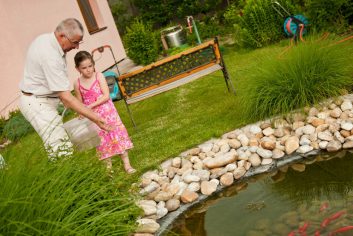Welcome back to this very important subject matter. The garden is an area with hazards everywhere at all times. But these hazards should not stop you from going out there, because your home has probably just as many.
So that you can relax a little and work more safely in the garden you should undertake a site assessment. This is for your own safety and perhaps more importantly for the safety of visitors to your site/garden. Visitors could be adults or children, friends or professionals so an open minded view of the site is needed.
Site Assessment:
- Trip hazards – differences in levels in paving, items obstructing walkways.
- Falling hazards – tiered beds, raised patios or indeed decking.
- Slip hazards – green wooden decking, very smooth paving.
- Digging hazards – electricity cables, gas pipes, water pipes.
- Chemical hazards – are pesticides and any flammable fuels stored?
- Biological hazards – certain plants can trigger allergic reactions with their pollen, can cause a chemical burn with their sap or poisoning/death if ingested.
- Weather hazards – Heavy rainfall makes surfaces more slippery from paving to soggy lawns. Also snow does this, plus it can freeze to create ice.
Hazards identified, you must then consider the chance of harm occurring to someone due to this hazard and the severity of the injury envisaged. Then put a few things in place to minimise the likelihood of an accident occurring.
- Ensure paving is adequately sloped for water to run off.
- Clean decking and cover in chicken wire or paint with a varnish containing fine sand. If there is a drop off the decking, install handrail and balustrades to prevent a fall.
- If you have steps, can a handrail be fitted to assist others to safely negotiate them?
- Could a ramp be installed for both wheelchair access and also for wheelbarrows/wheelie bins?
As an amateur Gardener you may not need to concern yourself with vibration syndrome/sickness or hearing loss from running loud equipment for prolonged periods, but it may be worth thinking about.
I SAID IT MIGHT BE WORTH………Never mind! LOL
As a professional Gardener I monitor any symptoms of vibration sickness and wear ear defenders to protect my hearing when running any power tools, even if rated within safe bounds. This is to prevent damage caused by prolonged exposure.
Speaking of exposure, a possibly less thought about hazard/risk to both amateur and professional Gardener is skin cancer. I personally wear a waterproof kids’ factor 50 sunscreen on my ears, face and arms. I also wear a hat as I am thinning on top too.
Skin is very sensitive and should also be covered by some kind of material while operating machinery. I also use a insect repellent with at least 50% Deet to prevent/reduce insect bites. These can lead to infection/swelling which could easily result in not being able to work or a more significant medical issue.
http://www.hse.gov.uk/statistics/industry/agriculture/index.htm
http://www.bbc.co.uk/gardening/basics/techniques/safety_prevent_accidents.shtml
So please invest in your safety and prevent the majority of potential accidents.


